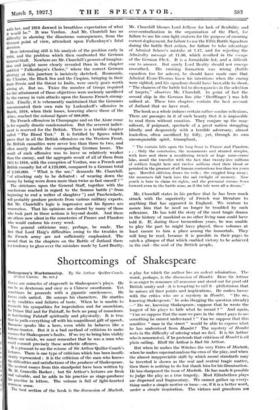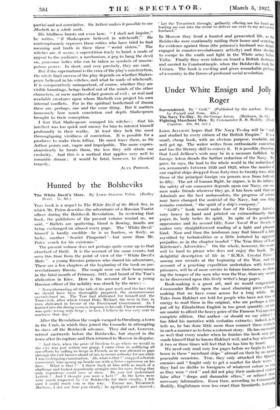Shortcomings of Shakespeare
Shakespeare's Workmanship. By Sir Arthur Quiller-Couch. (Fielder LTnwin. 9s. net.)
TI11:121: are miracles of stagecraft in Shakespeare's plays. He can be as dexterous and easy as a Chinese swordsman. Yet sometimes he proceeds with a gigantic carelessness. He leaves ends untied. He scamps his characters. He startles os by crudities and failures of taste. When he is unable to reconcile his sympathies for imperialism and for anarchism, for Prince Hal and for Falstaff, he feels no pang of conscience HI butchering Falstaff spiritually and physically. It is true that he pulls everything off with his magnificent gift of speech. Bassani° speaks lllce a hero, even while he behaves like a fortune-hunter. But it is a bad method of criticism to make excuses for Shakespeare's faults. If we try to bring him visibly before our minds, we must remember that he was a man who could commit precisely these aesthetic offences. It is pleasant to see the reissue of Sir Arthur Quiller-Couch's lectures. There is one type of criticism which has been insuffi- ciently represented : it is the criticism of the man who knows the difficulties and satisfactions of the producer of Shakespeare. The aeutest essays from this standpoint have been written by Mr.II, Granville Barker ; but Sir Arthur's lectures are fresh and valuable, and he adds to his practice as stage-producer his Practice in letters. The volume is full of light-hearted Common sense. The best section of the book is the discussion of Macbeth, a play for which the author has an ardent admiration. The worst, perhaps, is the discussion of Hamlet. Here Sir Arthur is so eager to renounce all nonsense and stand out for good old British sanity and—it is tempting to call it--Philistinism that he misses all finer points and implications. lie makes havoc with the critics who sec a mystery in Hamlet. " Do we, knowing Shakespeare," he asks (begging the question already) —" Do we, knowing Shakespeare, suppose that he wrote the longest of his plays to hide what he meant ? " And again, "Can we suppose that the man we pass in the street pays to see something he cannot understand ? " Can we suppose that this sensitive " man in the street " would be able to express what he has understood from Hamlet ? The mystery of Hamlet rests in the difficulty of uttering what we feel. It is Sir Arthur who is nonsensical, if he pretends that criticism of Hamlet is all plain sailing. Bluff Sir Arthur is Bad Sir Arthur.
But when he makes the Witches the very Fates of Macbeth, when he makes supernaturalism the crux of the play, and when the almost inappreciable shift by which moral standards may be inverted is shown as the real and central tragic matter, then there is nothing to do but thank him for his illumination. He has sharpened the issue of Macbeth. He has made it possible to judge the play as a true tragedy. Most Elizabethan plays are dispersed and fragmentary. We cannot gather up every- thing under a simple motive or issue—or, if it is a better word, under a simple inspiration. The virtues and grandeurs are
partial and not correlative. Sir Arthur makes it possible to see Macbeth as a whole work. • His bluffness bursts out even here. " I shall not inquire," he writes, " if Shakespeare believed in witchcraft." He contemptuously reproves those critics who have tried to find meaning and truth in these three " weird sisters." The witches are. it seems, a superstition ready to hand, a mode of appeal to the audience, a mechanism, a peg to hang the devil on, gruesome ladies who can be taken as symbols of unscru- pulous power. In short, and very precisely, they are cant.
But if the supernatural is the crux of the play's construction, the whole final success of the play depends on whether Shakes- peare believed in his witches, and what he made of witchcraft. It is comparatively unimportant, of course, whether they are visible hauntings, beings bodied out of the minds of the other diameters, or mere matter-of-fact powers of evil ; or real and available creatures upon whom Macbeth can project his own internal conflicts. For in the spiritual borderland of drama these are. perhaps, one and the same thing. But it matters immensely how much conviction and depth Shakespeare brought to their conception.
I fear that Shakespeare stamped his witches ; that his intellect was too quick and uneasy for him to interest himself profoundly in their reality. At least they lack the most thoroughgoing vividness of conviction. It is possible for a producer to make them telling. He must leave them, as Sir Arthur points 'out, vague and impalpable. The more expres- sionistically he treats them, the less they will strain our credulity. And this is a method that applies very well to romantic drama : it would he fatal, however, to classical tra!redy.
ALAN PORTER.































































 Previous page
Previous page